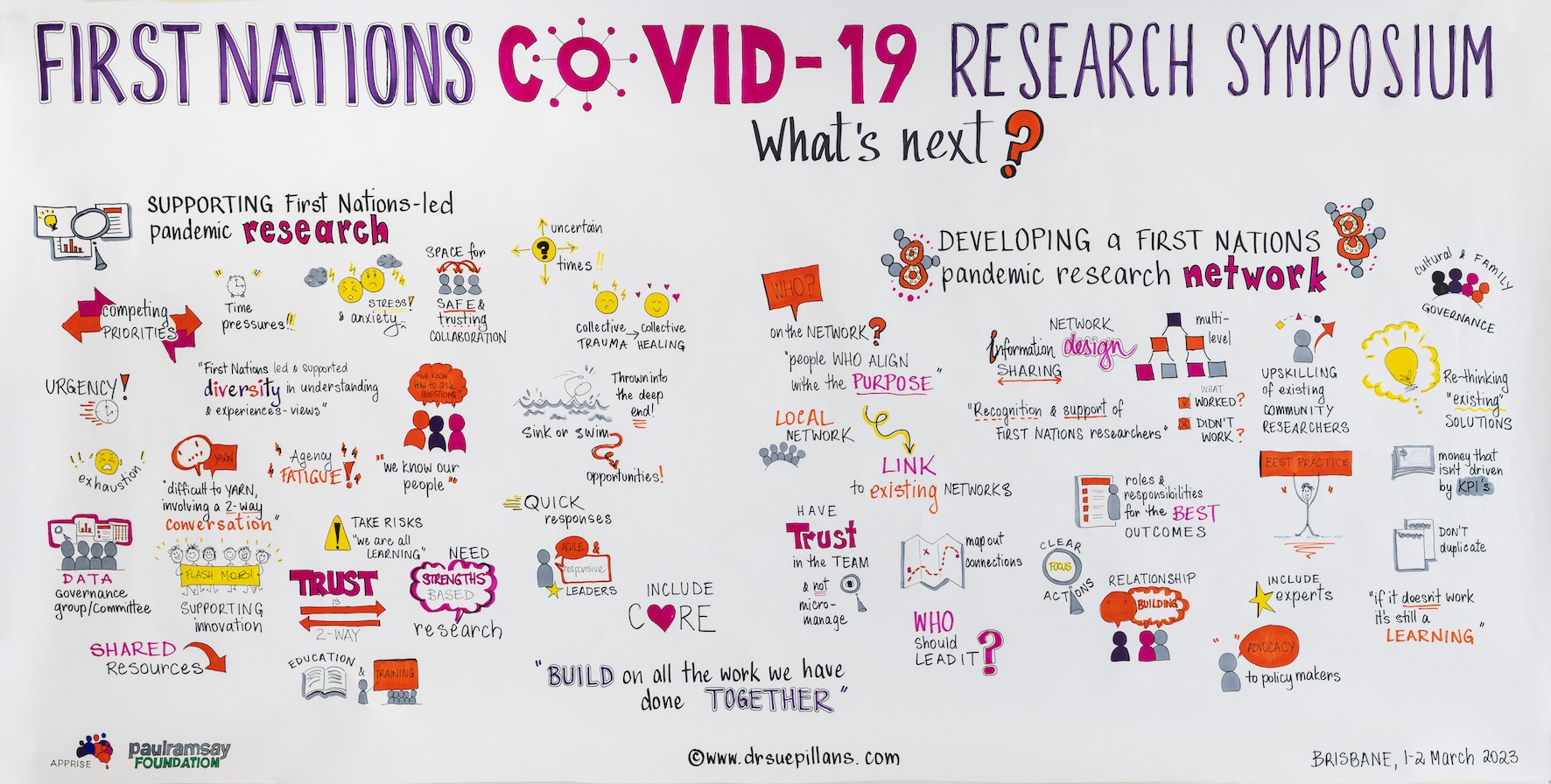10 May 2023
First Nations pandemic researchers celebrate their work and plan for the future
First Nations COVID-19 researchers have come together in Brisbane to celebrate findings from a pandemic grant program addressing First Nations-led COVID-19 research questions.
The First Nations COVID-19 Research Symposium was held at the Queensland Aboriginal and Islander Health Council as part of a unique pandemic funding program which prioritised First Nations research priorities and research teams.
The First Nations COVID-19 research program was established in April 2020 after a $2M donation from the Paul Ramsay Foundation for First Nations COVID-19 research via the Australian Partnership for Preparedness Research on InfectiouS disease Emergencies (APPRISE) based at the Doherty Institute. In early March this year, grantees came together for the first time to present their work and reflect on the program and what was learned through the pandemic.
The key architects of the APPRISE-Ramsay First Nations COVID-19 Grants were Professor Adrian Miller of the Jirrbal people of North Queensland and Deputy Vice-President, Indigenous Engagement, BHP Chair of Indigenous Engagement and Director of the Centre for Indigenous Health Equity Research at CQUniversity and Ms Kristy Crooks, an Aboriginal woman of the Euahlayi nation, PhD scholar and Aboriginal Program Manager with the Health Protection Unit for Hunter New England Population Health.

To decide upon research and application priorities, Professor Miller and Ms Crooks chaired a First Nations COVID-19 Research Council.
Ms Crooks said the Council was entirely comprised of senior First Nations researchers who ensured the grant process was centred on First Nations priorities and avoided the gatekeeping that can hinder First Nations-led research.
“The Council established the funding principles to be centred on community priorities, community governance and community control,” she said.
“An innovative design element was the ability for researchers outside the university system to apply, including Aboriginal Community Controlled Organisations.”
This design led to high-quality research projects undertaken close to communities around Australia. The presentations at the Symposium were diverse and came from well-established and emerging researchers from a variety of contexts including both community-controlled and academic institutions. The research included detailed investigations of community-led responses to the COVID-19 pandemic, exploration of the benefits and challenges of telehealth, and analysis of additional factors influencing COVID transmission and response such as housing and health messaging.
“The application process made sure grants were led by First Nations researchers and that at least half of each grant team were also First Nations people,” she said. “This meant that it was mostly First Nations people at the symposium, creating an energising and inspiring gathering that I was really proud to be a part of.”
“It was fantastic that all 10 grant teams plus representatives of the Paul Ramsay Foundation came to Brisbane so we had everyone together in one place,” she said.
The first day of the 2-day symposium featured presentations from the grant teams, with a second day enabling detailed discussion of the grant program and how the principles could be harnessed for the future.
Kristy reflected “meeting face to face was a real highlight, creating connections, inspiration and the exchange of results and ideas. Everyone was enthusiastic about a future First Nations-led network for pandemic research.”
Marine scientist and visual artist Dr Sue Pillans created graphic recordings to capture presentations and discussions. The Day 2 graphic recording of the “What’s next” discussion is shown below.
Plans are now underway to ensure that the principles of the grant program continue to support researchers and projects through an ongoing First Nations pandemic research network.
Funding: Paul Ramsay Foundation
The Australian Partnership for Preparedness Research on InfectiouS disease Emergencies (APPRISE) is an national network of experts involved in medical, scientific, public health and ethics research. APPRISE is leading targeted research programs on First Nations engagement, long COVID and antiviral use while developing and maintaining relationships and research platforms for future pandemic preparedness. The coordinating hub for APPRISE is based at the Peter Doherty Institute for Infection and Immunity. APPRISE is funded by the Australian Department of Health and Aged Care.


